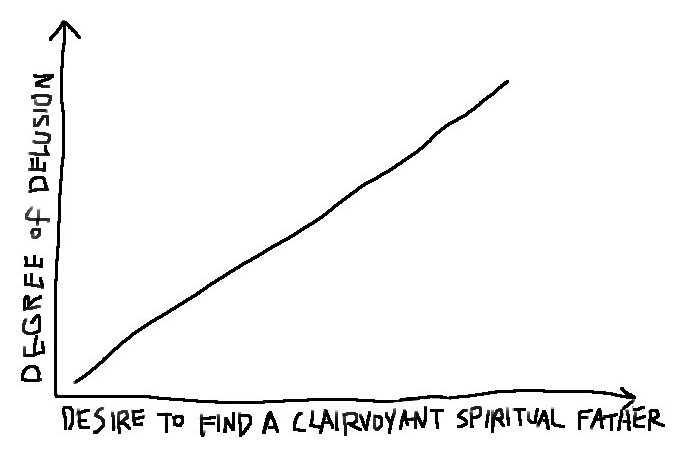This "miracle-lust" and "charisma-lust" is not unfamiliar, even
in the space of the Church. The presence of "signs" is
regarded by many as the supreme criterion and an imperative
guarantee of veracity. According to these people,
wherever there are no obvious signs and charismas, a...
guaranteed, bona fide Orthodoxy is not present!

This
disease has also infiltrated the manner in which the par
excellence Sacrament of Salvation -Sacred Confession- is
being confronted. Apparently, it is only when someone
possesses the charisma of insightfulness or perspicacity
that he can be regarded as an unerring spiritual guide!
However,
the Mystery of Repentance is in fact desecrated in this
manner: instead of it being a practice of self-reproach
(through the confessing of one's hidden thoughts and acts,
with humility), it has degenerated into a childish quest
for a witch doctor who will
reveal all of our sins, without us needing to exert
ourselves! The salvific advice of the Holy Fathers
is scorned: "Let us not seek those
(spiritual fathers) who can
foretell or foresee; rather, BEFORE ALL ELSE,
(seek) mostly those
with HUMILITY and BEFITTING TO THE AILMENTS WITHIN US"
(Saint John of Sinai, "The Ladder", Counsel No.4).
Orthodox
Christians who instead of seeking a priest-doctor that is
suitable for their ailments run after seemingly
far-sighted Elders do not differ all that much from
those who end up... drinking the water that Sai Baba washed
his feet in.
In both cases, the individuals are suffering from the same
unhealthy quest for miraculous and charismatic
experiences.
About
1500 years ago, Saint John the Chrysostom was JOYOUSLY
observing that even during his time, the... era of miracles
had come to an end! And he even explains why God ceased to
provide innumerable miracles and signs: God did this,
he said, "not to dishonor us, but in fact to GREATLY
HONOR us". God ceased His many miracles, in
order to honor us - and in fact to honor us greatly.
Immensely.
And what
kind of honor was that? Well, He honored us, by
pointing out to us that we were no longer infants. We were
now grownups. Miracles and signs were more necessary
during the first years of Christianity, as the people of
that era were still like immature infants: "People at the time were predisposed to
being more foolish, having only recently been rid of idols"
(Ανοητότερον
οι άνθρωποι διέκειντο τότε, των ειδώλων προσφάτως
απηλλαγμένοι.).
People had only just been rid of the delusion of
idols, so it was therefore quite normal that they would be
slightly thick-headed and insensitive to spiritual things:
"Their intellect was still much denser and more obtuse"
(Παχυτέρα και αναισθητοτέρα αυτών η διάνοια έτι ην),
which is why they gaped in amazement at the sight of
tangible miracles and signs: "They were intimidated by all
tangible things and dumbfounded" (προς τα σωματικά πάντα
επτόηντο και εκεχήνεσαν). They
thirsted only for "bread and spectacles". They could not
comprehend God's spiritual gifts, which one can only
appreciate through faith: "They had never seen what spiritual grace
could be, which is
only perceived by faith. It was for this, that signs took
place" (ουκ είδεσαν τι ποτέ έστι νοητή
χάρις, πίστει μόνη θεωρουμένη. Δια τούτο σημεία εγίνετο). (Saint John the Chrysostom, "On the
Holy Pentecost", Counsel No.1.)
"...But now that we have grown up (Saint Ignatius
Brianchaninov continues the thoughts of Saint John),
whoever still seeks miracles in order to believe, is to be
pitied! This demand of his betrays just how much his fleshly
conscience and his gross ignorance are dominant inside him.
Those who believe through miracles comprise the lowest ranks of
the
faithful...", Saint Ignatius concludes.
It is
therefore disgraceful - to say the least - when someone has
the potential to study at a University, yet desires to return
to nursery school! And in fact, to a nursery school
with doubtful charismas and suspicious visions, where he is
in danger of becoming seriously deluded.
The
greatest charisma, according to Saint John the Chrysostom,
that a person could ever receive, is to suffer for the glory
of Christ; to sacrifice himself, in obedience to His holy
will. "I do not honor Paul's hands", says the
holy Father, "that much for having raised up the lame
man at Lystra, but rather for their being shackled for
Christ. I do not regard Paul as blessed because he was swept
up to Paradise or because he had heard ineffable words, but
rather because he was imprisoned for Christ." Saint
John concludes: "I much prefer to suffer for Christ,
rather than to be honored by Him
(with charismas and visions).." (Saint John Chrysostom, E.P.E. 20,
594).
Let us
therefore carry a very small basket whenever we hear of huge
fig trees - and especially when they are fig trees that
artfully allow their supposed charismas and miraculous
abilities to be projected outwardly. The most wonderful and
life-shaking experience that a person can ever have, is to
be liberated from his passions and be cured, through his
obedience in Christ:
"For, if from inhumanity you convert to charity,
then you will have made the dried
(paralyzed) hand reach
out. If you abstain from spectacles
(television included) and come
to church, then the leg that is lame will be repaired. If
you restrain your eyes from beholding another's beauty, then
even
if they are blind they will be opened. If, instead of
satanic odes you learn spiritual psalms, then even if you
are deaf and mute, you shall be able to speak. THESE ARE THE
GREATEST OF MIRACLES..." (Saint John
Chrysostom, E.P.E. 10, 414).
Translation: K.N.
Source of image: Orthodox
Website "Pithlessthoughts"